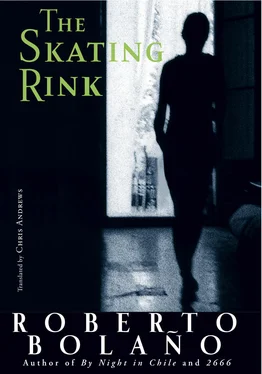Roberto Bolano - The Skating Rink
Здесь есть возможность читать онлайн «Roberto Bolano - The Skating Rink» весь текст электронной книги совершенно бесплатно (целиком полную версию без сокращений). В некоторых случаях можно слушать аудио, скачать через торрент в формате fb2 и присутствует краткое содержание. Год выпуска: 2009, Издательство: New Directions, Жанр: Современная проза, на английском языке. Описание произведения, (предисловие) а так же отзывы посетителей доступны на портале библиотеки ЛибКат.
- Название:The Skating Rink
- Автор:
- Издательство:New Directions
- Жанр:
- Год:2009
- ISBN:нет данных
- Рейтинг книги:5 / 5. Голосов: 1
-
Избранное:Добавить в избранное
- Отзывы:
-
Ваша оценка:
- 100
- 1
- 2
- 3
- 4
- 5
The Skating Rink: краткое содержание, описание и аннотация
Предлагаем к чтению аннотацию, описание, краткое содержание или предисловие (зависит от того, что написал сам автор книги «The Skating Rink»). Если вы не нашли необходимую информацию о книге — напишите в комментариях, мы постараемся отыскать её.
oscillates between two poles: a camp ground and a ruined mansion, the Palacio Benvingut. The story, told by three male narrators, revolves around a beautiful figure skating champion, Nuria Martí. When she is suddenly dropped from the Olympic team, a pompous but besotted civil servant secretly builds a skating rink in the ruined Palacio Benvingut, using public funds. But Nuria has affairs, provokes jealousy, and the skating rink becomes a crime scene. A mysterious pair of women, an ex-opera singer and a taciturn girl often armed with a knife, turn up as well.
A complex book,
’s short chapters are skillfully broken off with questions to maintain the narrative tension:
All of these questions are answered, and yet
is not fundamentally a crime novel, or not exclusively; it’s also about political corruption, sex, the experience of immigration, and frustrated passion. And it’s an atmospheric chronicle of one summer season in a seaside town, with its vacationers, its drifters, its businessmen, bureaucrats and social workers.
The Skating Rink — читать онлайн бесплатно полную книгу (весь текст) целиком
Ниже представлен текст книги, разбитый по страницам. Система сохранения места последней прочитанной страницы, позволяет с удобством читать онлайн бесплатно книгу «The Skating Rink», без необходимости каждый раз заново искать на чём Вы остановились. Поставьте закладку, и сможете в любой момент перейти на страницу, на которой закончили чтение.
Интервал:
Закладка:
Enric Rosquelles:
I know that whatever I say will only make things worse
I know that whatever I say will only make things worse; but still, let me tell it my way. I am not a monster, or the cynical unscrupulous character that you have been portraying in such lurid colors. Perhaps you find my physical appearance amusing. Go ahead and laugh. There was a time when people trembled before me. I’m fat, five foot eight, and Catalan. Also, I’m a socialist and I believe in the future. Or used to. Forgive me. I’m going through something of a rough patch. I believed in hard work, justice and progress. I know that Pilar used to boast about having me as her right-hand man when she met with the other socialist mayors in the province. Well, I always supposed she did, although now, in my new-found solitude, I keep wondering why I was never headhunted, why some big shot never tried to snatch me away from Z and Pilar, and give me a job somewhere closer to Barcelona. Maybe Pilar didn’t boast enough. Maybe they all had their own indispensable helpers and didn’t need anyone else. Within the bounds of Z, my power grew. And that sealed my fate. Z was where I did my good works as well as the deeds for which I shall have to pay. Although the Z City Council reviles me now, it still depends on all the projects and studies I supervised. I was the head of the Social Services Department, as I said, but I also looked after Urban Planning, and even the head of Parks and Recreation, a child molester who has the nerve to insult me now, used to come into my office each morning and ask for my advice. At festivities and official functions, I was always at Pilar’s side. Don’t jump to conclusions: for some reason, I don’t know why, our mayor’s husband hated gatherings of more than six people. Enric Gibert is what you might call an intellectual. Perhaps I would have been better off staying busy in my office like him, God only knows, but I didn’t and that was how I met Nuria, at an official function in the Z Sporting Complex. . Nuria Martí. . When I think of that afternoon, I can’t hold back the tears. . We were rather arbitrarily rewarding the merits of Z’s outstanding athletes. The prizewinners included a junior basketball team, which had done very well that season; a young soccer player who was in a second division A team; the trainer of Z’s football club, which was in the fourth division (he was retiring that year); the young water-polo players who had won the league championship; and finally, the star, Nuria Martí, who had just come back from Copenhagen, where she had defended the national colors, no less, in a figure-skating competition. . The pavilion was full of primary school students (their teachers had brought them for an outing) and when Nuria appeared in person the place went crazy. They were all shouting and clapping! Little ten-year-old squirts whistling and shouting Hurray for Nuria! I’ve never seen anything like it. Not that there had been some sudden figure-skating craze; it’s a sport with a small following, as everybody knows. Some of the kids, the girls especially, had watched the event on television and of course they had seen Nuria skate. For a few of them, she was an idol. But most of them were simply responding to the magnetic force of her fame and beauty. There, in front of me, was the most beautiful woman I had ever seen. The most beautiful woman I will ever see! They say children are good judges of character. As a psychologist and civil servant, I’ve never been convinced. But at least that time they were right. All the world’s adjectives fell short of Nuria’s luminous form. How could I have worked for so many years in Z without meeting her? The only explanation I can find is that I didn’t actually live in Z, and up until then, Nuria had spent long periods away, on a grant from the Spanish Olympic Committee. During the days that followed this sublime apparition (I’m afraid I can’t describe it any other way), I kept searching, almost unconsciously, for a pretext that would allow me, if not to become friends with Nuria, at least to say hello to her when we met in the street, and perhaps chat for a while. To that end, I invented a new title: Queen of the Annual Fair of Dairy Products and Vegetables, to be awarded by the Department of Fairs and Festivals, an idea which initially bewildered the committee of exhibiting farmers, but was adopted enthusiastically after a little explanation. I went on to suggest that no one was better suited to be Queen of the Fair than our international skating star, Nuria. A purely ceremonial and symbolic role. She would only have to say a few words at the opening. They were all delighted, so I moved straight on to the hard part of the plan: using that pretext to get her to see me, to recognize me. . Needless to say, the fair itself didn’t matter to me in the least; for the first time ever my heart was overruling my head, and I was more than happy to follow it. It was spring, I think, and I was constantly aware that I was heading for a fall, a ruinous fall, but I didn’t care. I only mention that now so as not to give the false impression that I was blinded. The Coordinator of Fairs and Festivals officially offered her the crown, which, as I had foreseen, she declined. One reason, the Coordinator informed me, was that she would soon be resuming her place on the Spanish skating team. There was clearly no time to lose. I had a valid reason for getting in touch with her, so I called her the same day and we arranged to meet at a place in the historic center of Z. I wasn’t able to convince her to accept the title of queen, of course, nor was that my aim, but I did manage to persuade her, in the end, to have dinner with me that week. That was how it all began. I never found out if there was a queen that spring. Our first dinner was followed by others, in rapid succession. I started getting to know the people she mixed with, and gradually my social habits changed. Our chance encounters became increasingly frequent. And increasingly pleasant. I must admit that I would have been content to go on like that for the rest of my life, but nothing lasts forever. As we got to know each other better, I began to get a clearer sense of Nuria’s problems; viewed from a different point of view, they might not have been problems at all, but her artistic temperament could quickly blow things out of proportion. I won’t mention the hundreds of little obstacles that life began to put in her way at that time. I’ll only recount the two that seemed most significant to me. I learned of the first after a pleasant dinner one night in the company of good friends, some of whom now seem to enjoy spitting in my face. When we left, Nuria instructed me to drive out to the coves instead of going straight back to her place. When we got to the farthest one, the cove of San Belisario, she started talking in a hesitant, incoherent way about an affair with some young man about town whom I had not met. I deduced that they had been engaged, and that the engagement had been broken off. I could tell that she was in pain and shock. Luckily it was dark in the car; otherwise she would have seen the contorted expressions on my face, betraying profound disbelief and disgust: how could there be a man capable of leaving her? I can say, however, that by unburdening herself in this way, she took our friendship to a new level of intimacy. How did I try to console her? What words did I find? Forget him. I told her over and over again to forget him and devote herself body and soul to her art, to skating. But, as it happened, the second problem was related to skating. It arose about ten days after Nuria left Z. The Spanish team had gathered in Jaca, in a special training center still under construction, from which Nuria called me at midnight, in floods of tears. They had cut off her grant! The bastards had all got together in Jaca and proceeded to hand out, renew and cut off grants. Nuria was certainly not the only one ambushed like that: in the space of a few hours, one Hungarian and two Scandinavian trainers were fired, not to mention various Spanish trainers, and almost all the skaters over nineteen lost their grants. The exceptions, according to Nuria, were highly suspicious. The story appeared the following day, not splashed on the cover of sports magazines, but tucked inside, in a single column of the winter sports section, and never made it into the national newspapers. For Nuria, however, it was a terrible blow. The Spanish Skating Federation had decided it had to rejuvenate itself or die, not an uncommon policy in Spain and generally quite futile. We all have to die a bit every now and then and usually it’s so gradual that we end up more alive than ever. Infinitely old and infinitely alive. As for Nuria, she was removed from the national team, but not from the Catalonian Federation, whose facilities she could continue to use for training and competitions. She was, understandably, demoralized and wounded in her sporting pride. Although there was, of course, no place for her on the new figure-skating team, she was better, as she said, than the two girls who now shared top billing. From the newspapers and from phone conversations with some journalist friends in Gerona, I was soon able to verify that most of the Catalan skaters had received the same treatment. Was it a case of Castilian, centralist favoritism? I don’t know, nor do I care — and at that point in my life all that mattered to me was what made Nuria happy or unhappy. The new situation was in a sense advantageous to me, because without a grant, Nuria would have to live a settled life in Z. But love is not selfish, as I have recently come to realize, and Nuria’s feeling of emptiness, the trouble she had adapting to a life without travel, just two weekly train trips to the Barcelona skating rink, made my heart bleed. When she came back to Z we had various conversations, sometimes in my office during working hours (she was the only person who was allowed to interrupt me whenever she liked, apart from Pilar, of course), sometimes down at the fishing port, leaning against the old boats nobody used any more, which smelt, oddly, of face cream, and we always came back to the same topics: the nepotism of the Olympic bureaucrats, the injustice she had suffered, her talent, which would wither away as the months went by. You might be wondering how we could have gone on talking about what was, in the scheme of things, a minor incident, when there were so many important and perhaps even pleasant things we could have said to one another. But Nuria was obsessive like that; when she came across something she didn’t understand, she beat her little blonde head against it over and over until she started bleeding. I had already learned that it was best to listen quietly, unless I had a practical solution to propose, but how could I take on the imperious Figure Skating Federation? I couldn’t, obviously. All I could do was let time go by. And meanwhile savor our moments together — I could now look forward to some each day — contemplate Nuria, enjoy that perfect weather in Z, and be happy. Did I try to make a move in all that time? Not once. I don’t know if it was lack of nerve, fear of spoiling our friendship, laziness or timidity, but I felt it would be prudent to let a little more time elapse. We are the authors of our own misfortunes, I’ve heard it said, but that fact is I was happy to play the role of the perfect chevalier servant . We went to the movies or to bars. We went driving. Sometimes we had dinner at her house, with her mother and her little ten-year-old sister Laia, who treated me, like I’m not sure what, a fiancé, or a future fiancé, I guess, I never really understood, but always in a friendly and relaxed way, in any case. After dinner we’d watch a video, usually one I had brought, or they left us alone in the little lounge, leafing through Nuria’s album of press cuttings and photos. Pleasant evenings. I have often thought that I should have stopped there, I should have said: This is enough, I’m happy, what more could I ask for? But love has no time for reasoning or limits, and it pushed me on. And that was how the Palacio Benvingut project began, ineluctably, to take shape. .
Читать дальшеИнтервал:
Закладка:
Похожие книги на «The Skating Rink»
Представляем Вашему вниманию похожие книги на «The Skating Rink» списком для выбора. Мы отобрали схожую по названию и смыслу литературу в надежде предоставить читателям больше вариантов отыскать новые, интересные, ещё непрочитанные произведения.
Обсуждение, отзывы о книге «The Skating Rink» и просто собственные мнения читателей. Оставьте ваши комментарии, напишите, что Вы думаете о произведении, его смысле или главных героях. Укажите что конкретно понравилось, а что нет, и почему Вы так считаете.












